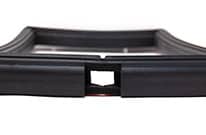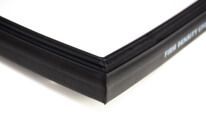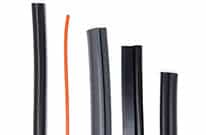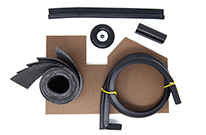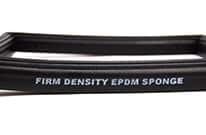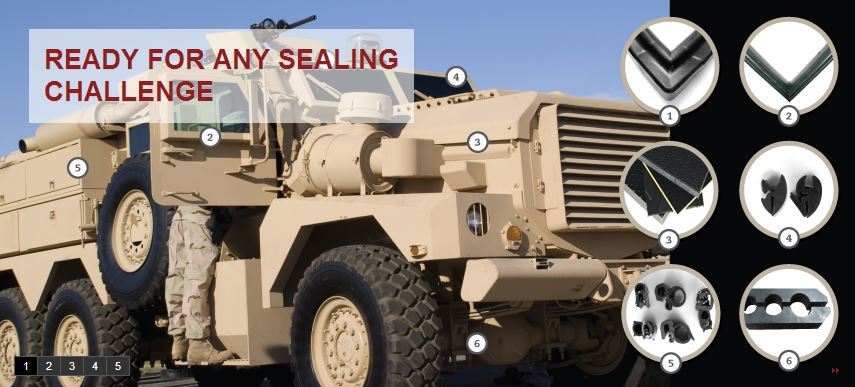
Doug Sharpe
President of Elasto Proxy
Sealing and insulation solutions for military applications must be able to withstand extreme conditions. Depending on the mission, service, and theater of operations, military vehicles may face high or low temperatures, snow or blowing sand, and attacks via land mines, rocket-propelled grenades (RPGs), or improvised explosive devices (IEDs).
In both Iraq and Afghanistan, armored fighting vehicles played a pivotal role in protecting U.S. and Coalition personnel. Most observers notice a military vehicle’s plating and weapons systems, of course, but rubber also plays an important role. That’s true as well for Coast Guard and Navy frigates, and for Air Force helicopters and air planes.
Spliced and Molded Window Gaskets
Elasto Proxy designs and custom-fabricates many different rubber parts for military applications. In the image that accompanies this blog entry, callouts 1 and 2 show examples of spliced and molded window gaskets. With film splicing, our custom fabrication specialists can create rubber gaskets with strong bonds – and without adhesives or secondary trimming.
Other available splicing solutions include cold bonding, vulcanizing, and C-press injection molding. The C-press process is more expensive than film splicing, but is often the right choice for square gaskets with radius corners. C-press injection molding is also recommended for bulbs with difficult shapes, especially with small-to-medium quantities of the most challenging seal designs.
Acoustic and Thermal Engine Bay Insulation
Elasto Proxy also supplies military vehicles with engine bay insulation. In the image above, callouts 3 and 4 are examples of acoustic insulation and thermal insulation. Both types of specialty insulation products can be made of composite materials and then formed into application-specific shapes and thicknesses. Typically, the structure is sandwich-like with multiple layers.
Acoustic engine bay insulation is usually made of lightweight, sound-dampening materials that allow sound waves to bounce off. Thermal insulation is designed to absorb heat from an engine compartment and deflect heat away from the cab. Silicone, a synthetic resin, is often used because it resists high temperatures and provides acoustic insulation at the same time.
Windows Channels, Sealing Profiles, and Vibration Mounts
In addition to window gaskets and engine bay insulation, Elasto Proxy can also supply specialty window channels and custom rubber profiles. In the blog image, the rubber channels shown in callout 5 help can be used to secure window frames and hold window glass in place. These rubber parts also seal gaps and help prevent the ingress of dust, smoke, or water into the vehicle’s interior.
Elasto Proxy can also custom-fabricate rubber profiles that help keep air, sand, and water out of a vehicle compartments. As callout 5 shows, sponge profiles and solid profiles are available for specialized applications. Finally, as callout 6 indicates, Elasto Proxy can supply vibration mounts for sensitive electronic displays within a vehicle’s interior.
How Can We Help You?
Do you have questions about rubber products for military vehicles? Are you seeking a supply chain partner whose experience with sealing and insulation complements your own expertise in defense contracting? For 25 years, Elasto Proxy has been solving sealing challenges in military programs on land, air, and sea.
Please contact us for more information, or join the conversation on our social media channels. Look for a post with a link to this blog entry on LinkedIn, Facebook, Google+, and Twitter. Elasto Proxy has a YouTube channel, too. Finally, please subscribe to our free e-newsletters. They’re a great source of information delivered right to your email inbox, and they provide links to blog entries like this one.







